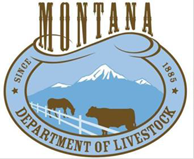The Montana Department of Livestock announced that an animal from a Gallatin County ranch within Montana’s Designated Surveillance Area was recently confirmed infected with brucellosis.
The infected animal had a negative test in 2021 but tested as a “reactor” during a voluntary herd test in January. Pathologists at the Montana Veterinary Diagnostic Laboratory collected tissues from the animal post-mortem and sent the samples to the National Veterinary Services Laboratories in Ames, Iowa, where infection was confirmed by culture. The DOL quarantined the herd when the reactor was discovered and initiated an epidemiological investigation.
DOL encourages voluntary herd testing to reduce the impact of brucellosis on Montana livestock producers. Annual testing reduces the spread of disease within a herd, should it become infected with brucellosis, by rapid disease detection. Regular testing can also reduce the impact on neighboring herds which DOL also quarantines until they can prove they are free of infection through herd testing. Epidemiological testing can be inconvenient and cause additional costs.
“A voluntary annual herd test can be performed at a time when animals are already being worked such as fall pregnancy checking,” says State Veterinarian Dr. Marty Zaluski. “The ability to control the timing of a herd test minimizes disruption when testing is required as part of an epidemiological investigation.”
Zaluski further praised Montana DSA producers for their high rate of compliance with brucellosis regulations.
“A robust testing program not only benefits individual operations but protects our entire industry and our trading partners,” added Zaluski.
Brucellosis is a bacterial disease that can infect humans, cattle, bison, and elk and can result in abortion or the birth of weak calves. The disease is primarily transmitted through contact with infected birth tissues and fluids. Past cases of brucellosis in livestock were a result of transmission from infected wild elk as determined by epidemiological investigation which involves testing of adjacent or contact herds and genetic fingerprinting (genotyping) of the cultured bacteria. The source of infection in the Gallatin County herd has yet to be determined.



